37 Super Useful Japanese Phrases for Tourists (& FREE PDF Cheat Sheet!)

Don’t be worried about the language barrier in Japan! I promise it’s easy to learn a few common Japanese phrases for tourists beforehand to help you better “blend in.” Over the past decade from Australia, I’ve visited Japan regularly for business and leisure (and shared all my itineraries on my Japan blog). I don’t speak Japanese fluently by any means, however, let’s say I am fluent with useful Japanese travel phrases and will share them all with you! I taught myself how to read the Japanese language systems of Hiragana , Katakana and basic Kanji through simple methods. If I can do it, I know you can with my easy guide to Japanese phrases with pronunciation below. While I’ve also completed two Japanese for travel courses that covered the Japanese language at a beginner’s level, I’ve saved you the hassle because you can skip straight to the good part with my FREE downloadable Japanese for tourists PDF cheat sheet down the page. If you’d like to learn the most useful Japanese sayings to make your trip easier, read on for more!
This guide to basic Japanese phrases for travel will cover:
- 37 Basic Japanese phrases for tourists’ everyday use
- How to pronounce simple Japanese words and phrases
- The three Japanese language systems simplified
- The Japanese number system simplified
- FREE Japanese for tourists cheat sheet PDF download for offline use
- Additional resources to learn Japanese phrases for travel
This post contains affiliate links. I may earn a small commission if you click through and make a purchase.

TIP: This guide covers everyday, basic Japanese for travel that visitors will find useful when in Japan. For fascinating Japanese expressions you can use at home, take a look at my guide to beautiful Japanese words and their meanings.
37 Basic Japanese phrases for tourists’ everyday use
Proofread by long-term expats I know living in Japan for accuracy, for your quick reference I’ve created this list of the most common Japanese sentences for daily use. Plus, some alternatives in context to set you apart from the average tourist.
Japanese basic conversation
The following common phrases in Japanese are the most useful Japanese phrases for travellers. I’ll detail each of the Japanese words in English and the most appropriate time to use them:
Hello: Konnichiwa こんにちは
- One of the famous Japanese basics you’re probably already familiar with. Konnichiwa こんにちは is the Japanese word for hello, best used when meeting and greeting people.
- When entering a restaurant or store, don’t be surprised if staff say or yell irasshaimase いらっしゃいませ, which just means welcome in Japanese!
Good morning: Ohayo gozaimas おはようございます
- You’ll be greeted with ohayo gozaimas おはようございます as good morning in Japanese by staff at your hotel, or in stores.
- It’s one of the most common expressions in Japanese you’ll hear.
- Be sure to reciprocate the greeting, and slightly bow your head in return! But how much to bow? See my guide for using correct etiquette in Japan .
Good afternoon: Konnichiwa こんにちは
- No, this isn’t a typo! To greet someone in the afternoon in Japanese, konnichiwa こんにちは is also used. That’s one less phrase you’ll have to remember now, heh.
Good evening: Konbanwa こんばんは
- Quite obvious, konbanwa こんばんは is good evening in Japanese. Useful if you’ve finished eating dinner at a restaurant; saying goodnight to the chef and staff as you leave; or greeting staff at your hotel when you return for the night.
Good bye: Sayonara さようなら
- Sayonara さようなら is used as a final good bye in Japanese, when you know you may not see that person again. Handy to use if you’re following one of my itineraries for Japan !
- If you know you’ll be seeing the person again soon, ja matane じゃあまたね meaning “see you later” is more appropriate.

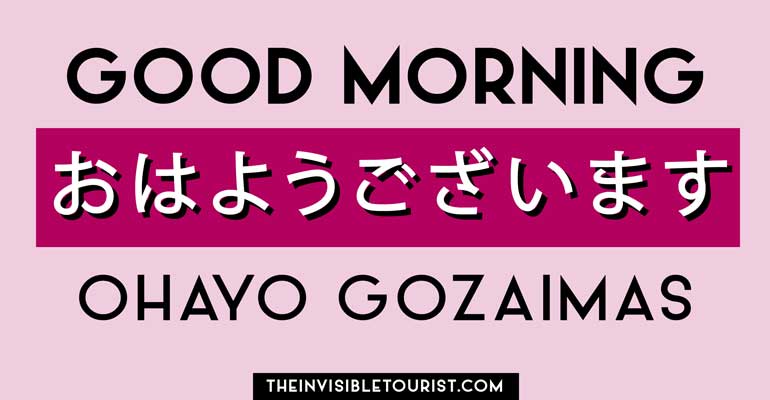


Please: Kudasai ください
- You can use kudasai ください as please in Japan when you’re asking for something, for instance buying items from a convenience store or purchasing train tickets .
- If you’re offering something, like allowing someone to enter a doorway before you, dozo (doh-zoh) どぞ” and an open hand will take your politeness to the next level.
- When you’re wanting to say please in the context of asking someone to help you out, you can finish the sentence with onegashimas おねがいします instead.
Thank you: Arigato gozaimas ありがとうございます
- You’ll hear and use arigato gozaimas ありがとうございます as thank you in Japan a LOT. If you can only master one of the simple Japanese phrases, let it be this!
- You can also use domo arigato どうもありがとう or simply domo どうも if you want to be super polite.
- If it’s your final encounter with the person, arigato gozaimashta ありがとうございまでした can be used instead.
- Much like other languages, there are different dialects in Japan. For instance in Kansai-ben (dialect of the Kansai region: eg Kyoto, Osaka, Nara), if you’d like to delight locals there say okini おおきに with a long “o” sound.
- TIP: If a local says arigato gozaimas to you, respond with you’re welcome in Japanese, which is doitashimashte どういたしまして.
Excuse me/Sorry: Sumimasen すみません
- Sumimasen すみません as excuse me in Japan is used for getting someone’s attention.
- Contrarily, gomennasai ごめんなさい is the more literal translation of “I’m sorry” but that’s more used as an apology. However, if you accidentally bump into someone sumimasen すみません is more commonly used.
- Definitely one of the most common phrases in Japanese you’ll use when exploring famous sites in Japan !
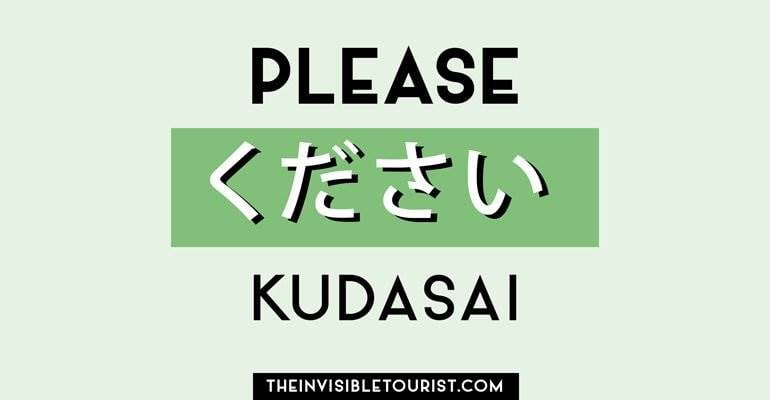


How are you?: O genki des ka? お元気ですか?
- Want to start a basic Japanese conversation? O genki des ka? お元気ですか is a great ice-breaker to help you practise some Japanese.
- This is a good one if you get talking to some locals at an izakaya (Japanese style pub).
I’m fine, thanks: Hai, genki des はい, 元気です
- Hai, genki des はい, 元気です is a polite way to answer “how are you?” to anyone who asks.
- They may think that your Japanese vocabulary is larger than it seems, responding with nihongo jozou 日本語上手. This translates to “Your Japanese is very good!”
My name is…: … des です
- Simply insert your name where the dots are, for instance mine is “Alyse des.”
- Other resources may say to use watashi 私の名前は for “I am” first. To set yourself apart from other visitors, you can actually ditch the watashi as the context will be obvious to locals.
- This is useful to know when introducing yourself to someone you’ve just met, or when checking into your hotel or accommodation.
- When meeting people for the first time, you can add “Nice to meet you” in Japanese by saying hajimemashte はじめまして.


Yes: Hai はい
- It’s pretty obvious when you would use hai はい, no explanation needed here. “No” is a different story, though!
No: Kekko des けっこうです
- Every other guide to Japanese for tourists will tell you to say iie いいえ, but I disagree.
- A politer and more formal way to say no in Japanese is kekko desu けっこうです. As Japanese people are so polite, they don’t use the word “no” directly. They may allude to the meaning of no, but not say it specifically. Gotta read between those lines!
- If you say iie (ee-eh) for no, you may receive a strange look. It’s not meant to be used when refusing something. You really need to draw out that “ii” sound otherwise the word ie means “house.”
- Chotto ちょっと meaning “it’s a little…” is another way to say no in Japanese depending on context.
- Reader’s Tip: Another handy replacement for “iie” is daijyobudesu 大丈夫です. It can mean “I’m good” or “no worries” without sounding disrespectful. I personally use this all the time!

Phrases in Japanese for shopping and dining
These Japanese words with translation will help you when travelling around Japan:
I’d like…: … O kudasai …をください
- Perfect to use in restaurants or when eating out, … o kudasai …をください is a polite way to ask the food or item you wish to order.
- Just insert the word you need where the three dots are.
What is this?: Kore wa nan des ka? これは何ですか
- Kore wa nan des ka? これは何ですか is one of the most useful everyday Japanese phrases. It’s especially handy when shopping for food.
- Remember to learn some possible responses like chikin チキン (chicken), beefu ビーフ (beef), porku ポーク (pork) or sakana 魚 (fish). Better yet, learn about these traditional Japanese snacks so you know what to expect in advance.
- I’d also advise learning the names for the foods you are adverse to so you don’t order them by mistake!
How much is this?: Ikura des ka? いくらですか
- Ikura des ka? いくらですか is a great little phrase to find out how much something costs. If you don’t know the names of numbers in Japanese when they respond, motion to the shopkeeper to write it down.
- You’ll likely need this when purchasing souvenirs and things you can only buy in Japan . It’s another of my most-used daily Japanese phrases.
- TIP: I’ve got a little guide to numbers further down the page to help you out.



Enjoy the meal: Itadakimas いただきます
- From a young age, Japanese children are always taught to give thanks before their meals. You may notice locals even when dining on their own will say itadakimas いただきます before eating.
- While English has adopted the French phrase bon appetit to say before meals, in Japanese it translates to “I humbly receive” and is usually said when quietly clapping hands together once.
Cheers! Kanpai! かんぱい !
- If going out drinking with locals, saying kanpai かんぱい as cheers in Japanese with a clinking together of glasses is the norm. It translates to “dry cup!”
The bill/check, please: Okaikei wo onegaishimas お会計をお願いします
- Once you’ve finished your meal in a restaurant say, Okaikei wo onegaishimas お会計をお願いします to your waiter for the bill/check to be brought over to you for payment.
- If you’d like to show your gratitude to who prepared the food you can say, Gochi so samedeshta ごちそうさまでした which means “thank you for the meal.” It can also mean, “It tasted good!”
Do you accept credit cards?: Kurejittokado wa tsukaemas ka? クレジットカードは使えますか?
- While credit cards and things like Apple Pay are widely accepted, cash is king in Japan and usually the preferred way to pay for smaller things.
- If you’re spending big on a particular item, this is a handy phrase to check you don’t need to withdraw cash to carry out your purchase.
- You can also shorten it to kurejittokado des ka? クレジットカードですか and be understood, too.

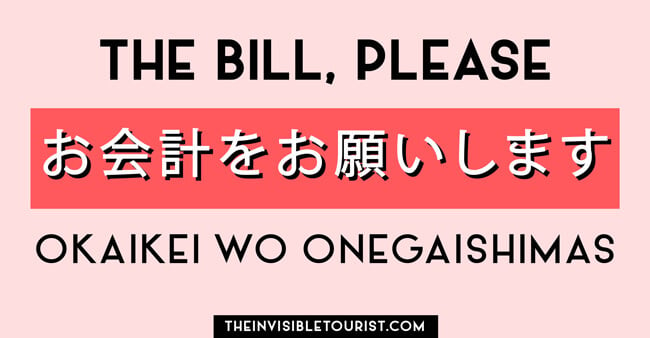

Useful phrases in Japanese to ask for help
Use the following basic words in Japanese if you need to ask a local for assistance:
Can you speak English?: Eigo wa hanasemas ka? 英語を話せますか?
- Tourists’ most used sentences in Japanese, for sure! The word for English eigo 英語 is pronounced more like “air-go”. Most Japanese people will politely shake their head in response to this question, despite having learnt some English at school.
- Generally speaking, they tend to be a little shy in practising English because they aren’t fluent. But you’ll soon find their definition of not speaking English is different to yours!
- In my experience, people I encounter who say they couldn’t speak much English often speak well enough to get their message across.
- In major cities like Tokyo and Osaka , English will be more widely understood, but not so much the further south you go towards Hiroshima , and older folks in Kyushu barely use it at all. Just keep your sentences short, simple, clear and it’s likely you’ll be understood.
- Planning to drive during your trip? Make sure to remember my handy words to use at petrol stations when driving in Japan!
Where is the toilet?: Toire wa doko des ka? トイレはどこですか?
- When nature calls, Toire wa doko des ka? トイレはどこですか? is an essential Japanese phrase to know.
- If you’re looking for something else other than a toilet, you can replace the word for toilet ( toire トイレ) with the thing you’re after. For instance, eki 駅 (train station) would be “eki wa doko des ka?”
- “… wa doko des ka” is one of the Japanese basic sentences you’ll use most.

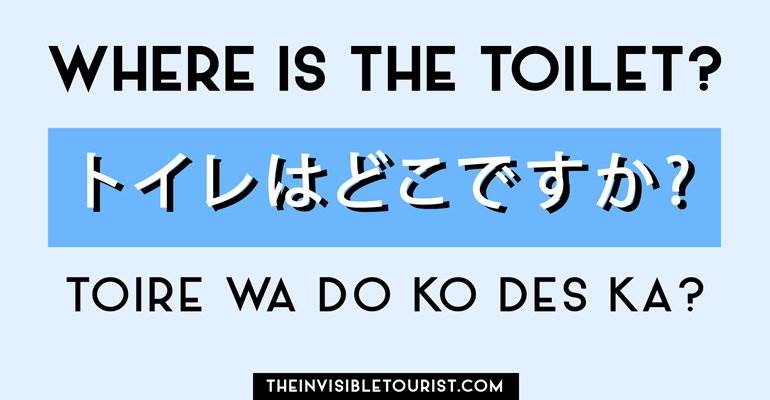
Can you translate this for me?: Yakushite, kudasai? 訳してください
- Yakushite, kudasai? 訳してください is ideal for asking a native speaker to translate a paper map, tickets, or anything else you can’t seem to understand in its context.
I don’t understand: Wakarimasen 分かりません
- If it’s all getting a bit much for you, wakarimasen 分かりません is a good Japanese phrase to use. You may need to throw in a few hand gestures from here!
Help: Taskete たすけて
- If you’re in need of help from locals, taskete たすけて is the Japanese word to use. It’s particularly useful if there’s an emergency and you need assistance.

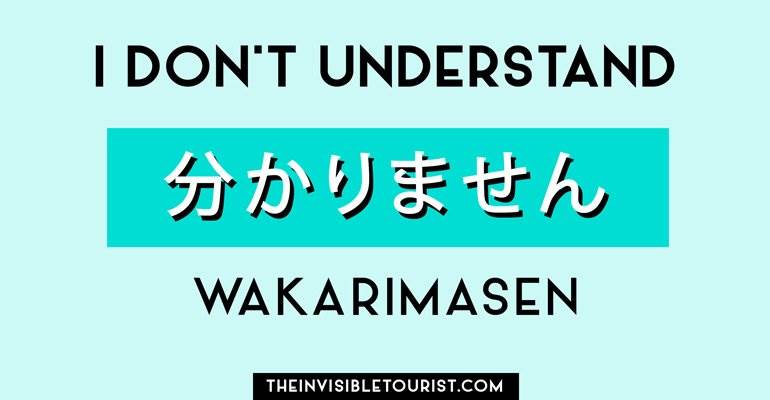

How to pronounce simple Japanese words and phrases
Are you ready to master everyday Japanese phrases? I highly recommend listening to some Japanese audio so you can get the hang of how to pronounce the words and phrases correctly to avoid locals looking at you like you’ve got two heads.
No need to be daunted by the task of learning THREE alphabets (if you don’t want to). Even if sometimes I don’t know exactly what I’m reading, I can piece the puzzle together.
As a general rule, pronounce basic Japanese words by breaking them down into their syllables . For example, onegai shimasu (“please” when asking a favour) is pronounced altogether as o-ne-gai-shi-mas.
In English and other Romance languages we tend to have letters that blend together to make some sounds. Japanese doesn’t really, which makes pronunciation much easier for us!
TIP: I’ve shared my recommendations for additional resources to learn Japanese down the page.
The three Japanese language systems simplified
Being able to read Hiragana ひらがな (the swirly one), Katakana カタカナ (the pointy one used for “borrowed” or foreign words) and some basic Kanji 漢字 (derived from Chinese) is SUPER helpful when you’re navigating your way around Japan. This basic Kanji chart is a good one to recognise some common signage in Japan.
Here’s my little guide for how to pronounce Hiragana and Katakana (my Japanese phrases cheat sheet PDF is further down the page). Read it left to right, so the second line is the sound KA, followed by KI, KU, KE, KO, and so on.

TIP: One super important thing: Much of the time the letter “u” is somewhat silent, or its full sound is cut short. For instance, the sound “su” す is mostly pronounced with just the “s” sound, which is why the pronunciation in my above images reflect this. So arigatou gozaimasu becomes arigato gozaimas (more below about this).
The same can be said for “i” in the instances of shita . As an example, mashita becomes mashta .
Also, words ending in ます “masu” are pronounced like “muss” rather than “mAs”. For example, “arigato gozaimuss.”
The Japanese number system simplified
- Luckily for English-speakers, the Arabic-Hindu numerals we all know and use in the Western world are widely used in Japan. This makes reading numbers easy for us! Their pronunciation is different, though.
- You may see the traditional numbers used throughout the country, especially at temples, shrines and they are sometimes used at market stalls.
- In terms of price, you’ll notice the 円 symbol for Japanese yen rather than ¥ that we tend to use in the West.
- If you’re in a store asking for a quantity of something, it’s good to be able to pronounce numbers 1 through 10 so you can get by. If all else fails, at least you can write it down!
TIP: Some guidebooks and other resources may teach you to say shi for the number four. I recommend not to do this; the word “shi” has a negative connotation as it’s associated with death in Japan.

FREE Japanese travel phrases PDF Cheat Sheet
Click on the image below to download my FREE PDF of all the useful Japanese language basics I’ve listed above. It’s a super handy Japanese for tourists printable to take with you, or store it on your phone for offline use when you’re adventuring around Japan!

But that’s not all… Don’t forget to keep reading below to discover more resources for learning Japanese and where you can find them.
Additional resources to learn Japanese phrases for travel
These resources boosted my Japanese language learning specifically. To learn any language quickly, read guide to learning any language for travel .
Memrise App
- My favourite app is Memrise to learn simple phrases in Japanese, how to read Hiragana and Katakana .
- It’s tailored to you and taught me how to read Japanese easily as a visual learner.
- While it does come with a premium version, I never purchased it as the free option provided what I needed.
Best books to learn Japanese phrases for tourists
If you’re a book lover like me, you may want to use a phrasebook instead of Google Translate to study some extra travel phrases in Japanese.
The following books are my top 3 that helped me learn Japanese language basics for my first trip to Japan and subsequent visits. You definitely don’t need this many but I found each helped me in a different way, which I explain below.
- Order AJALT Japanese for Busy Peoplehere →
- Recommended by my university short course in Japanese, this doesn’t go into a crazy amount of detail. Just the situations you would normally use Japanese to survive as a tourist (or there on a business trip).
- Has exercises to test your knowledge and includes some notes about Japanese culture (I’ve also written my own article about do’s and don’ts when visiting Japan ).
- Includes a 70-minute audio CD covers the pronunciation from exercises from the book.
- Order Berlitz Japanese Phrasebook and Audiohere →
- After using Lonely Planet phrase books exclusively for years I was introduced to this book by a paid language course I took at my community college.
- Although the content is very similar to Lonely Planet’s, I found some of the Berlitz phrases were more simplified, which made them easy Japanese words to say and remember. The phrasebooks are also compact and cover most travelling situations.
- Order Chineasy by Shaolan here →
- Overwhelmed by the thought of 2000+ Kanji? Chineasy is going to be your best friend! Although this book is to help you learn Chinese, it’s a game changer when learning Kanji as this is derived from Chinese.
- Pronunciation of symbols may be different than Japanese, but this book easily breaks down the Kanji into simple pictures to help you remember what they mean. If you forget how to say them at least you’ll be able to understand the basics, which is perfect if you’re a visual learner like me.
- Take it one step further and play the Chineasy Memory Card Game – a fun way to learn Kanji!

Concluding learning easy phrases in Japanese for tourists
If you’ve made it this far, you must be really keen to learn the common Japanese words, so I wish you the best on your learning journey. Now you’re set with the basic phrases in Japanese you’ll need, as well as how to pronounce them and the best context to use each.
I hope you’ll also find my free PDF cheat sheet helpful, too! What do you think of these Japanese words and meanings? Will you use them on your trip? Feel free to ask me any questions in the comments below.
Hungry for more? I’ve shared loads of tips and tricks for Japan , focused around how to be an invisible tourist whilst you’re there. If it’s your first trip or revisiting, my popular travel blog for Japan includes do’s and don’ts for etiquette, detailed itineraries, hidden gems, city guides, places you must visit in Japan and much more .
If you found this helpful or know someone who is planning a trip to Japan, please share it around as it really helps me in return! You can also come and join me on Facebook, Pinterest , Instagram and TikTok for more Japan inspiration!
Until next time,
This guide to Japanese phrases for travel contains some affiliate links, at no extra cost to you. I may earn a small commission if you decide to make a purchase and if you do, thanks for your support! This helps with the costs of running my blog so I can keep my content free for you. As always, I only recommend a product or service that I genuinely love and use myself!




























